英语人教版九年级全册Unit 6被动语态
- 格式:doc
- 大小:16.50 KB
- 文档页数:3
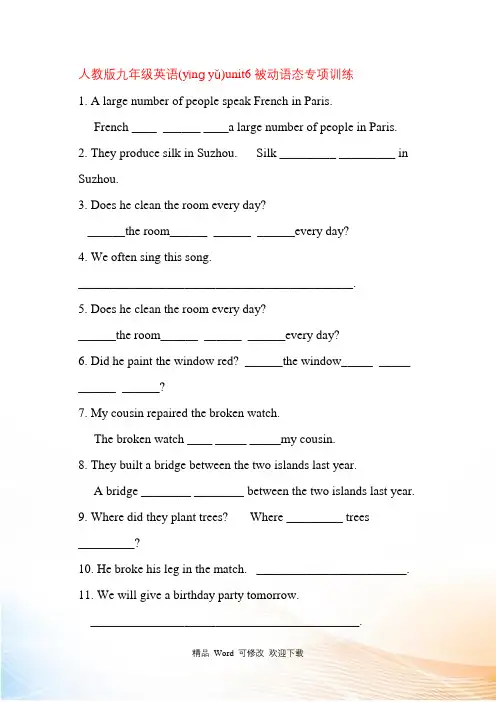
人教版九年级英语(yīnɡ yǔ)unit6 被动语态专项训练1. A large number of people speak French in Paris.French ____ ______ ____a large number of people in Paris. 2. They produce silk in Suzhou. Silk _________ _________ in Suzhou.3. Does he clean the room every day?______the room______ ______ ______every day?4. We often sing this song.____________________________________________.5. Does he clean the room every day?______the room______ ______ ______every day?6. Did he paint the window red? ______the window_____ _____ ______ ______?7. My cousin repaired the broken watch.The broken watch ____ _____ _____my cousin.8. They built a bridge between the two islands last year.A bridge ________ ________ between the two islands last year.9. Where did they plant trees? Where _________ trees_________?10. He broke his leg in the match. ________________________.11. We will give a birthday party tomorrow.___________________________________________.12. She will sell her house soon.___________________________________________.13. We will build a new library this year.A new library______ _______ _______by_______this year.14. People are still cutting down too many trees in the USA.______________________________________________________.15. He is repairing the machine.___________________________________________.16. Are they teaching foreign languages there?______foreign languages________ ________there?17. Are you going to make a new plane?____a new plane_____ _____ ______ _____?18. He has finished his work.________________________________________.19. Have they finished the new project?______the new project______ _______by______?20. We should plant the trees around the lake.The trees _____ _____ ______around the lake.21. You can borrow two books at a time.Two books _________ _________ _________ at a time.22. We call maths the language of science.Maths _________ _________ the language of science.23.The teacher made the students copy the text.The students _________ _________ _________ copy the text.24. Someone saw John cross the street just now.John _______ _______ _______ ______ the street just now by someone.25. The boss made the workers work all dayThe workers ____ ____ ____ work all day by the boss.26. He gave me a bookI ______ ______ a book by him.A book ____ ____ _____ me by him .27. My mother made me a cake .I ____ _____ a cake by my motherA cake ____ ____ ____ me by my mother .28. I heard Tom singing just nowTom _____ _____ _____ by me just now .29. We should take care of the old . The old should ______ _____ _____ _____ .30. My aunt bought me a present on my birthday.I ____ _____a present by my aunt on my birthday.A present _____ ____ _____me by my aunt on my birthday.内容总结(1)______foreign languages________ ________there。
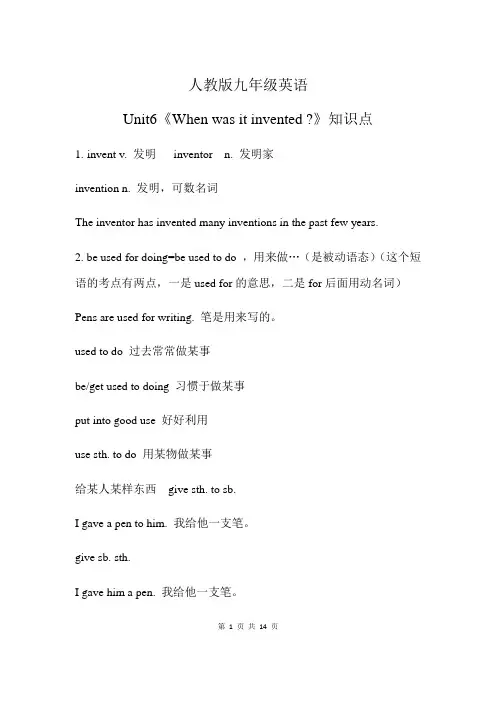
人教版九年级英语Unit6《When was it invented ?》知识点1.invent v. 发明inventor n. 发明家invention n. 发明,可数名词The inventor has invented many inventions in the past few years.2. be used for doing=be used to do ,用来做…(是被动语态)(这个短语的考点有两点,一是used for的意思,二是for后面用动名词)Pens are used for writing. 笔是用来写的。
used to do 过去常常做某事be/get used to doing 习惯于做某事put into good use 好好利用use sth. to do 用某物做某事给某人某样东西give sth. to sb.I gave a pen to him. 我给他一支笔。
give sb. sth.I gave him a pen. 我给他一支笔。
第 1 页共14 页pass/offer /send/show/write/bring/sell/lend/serve/ tobuy/cook/make/get/sing/prepare for4. all day 整天all evening/night the whole day5. salty adj. 咸的salt n. 盐sour/sweet/bitter/hot/salty酸甜苦辣咸6. by mistake 错误地(犯错是:make mistakes=make a mistake,这些常见的短语大家务必要掌握)I took the umbrella by mistake. 我不小心拿错了雨伞。
7. by accident/chance 意外,偶然(常见短语,考的最多的是它的意思)I met her by accident at bus stop.我在公共汽车站意外地见到了她。
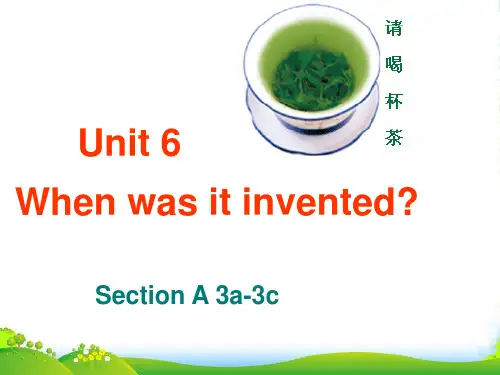
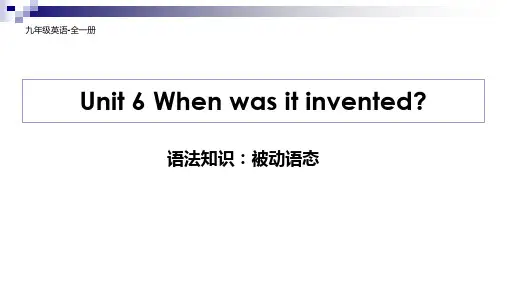
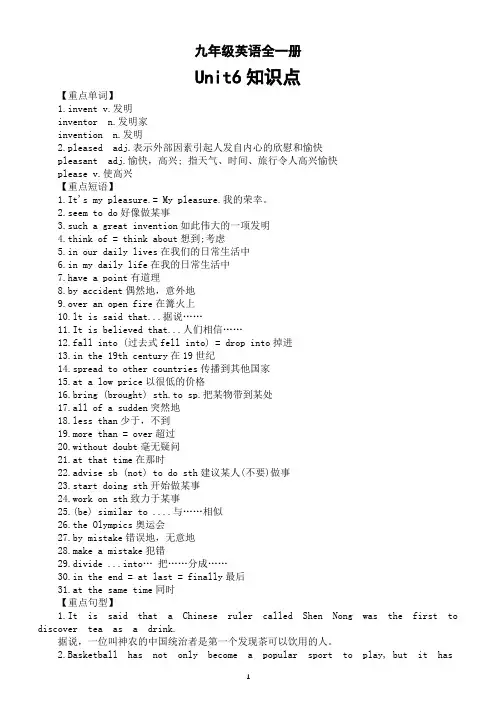
九年级英语全一册Unit6知识点【重点单词】1.invent v.发明inventor n.发明家invention n.发明2.pleased adj.表示外部因素引起人发自内心的欣慰和愉快pleasant adj.愉快,高兴; 指天气、时间、旅行令人高兴愉快please v.使高兴【重点短语】1.It's my pleasure.= My pleasure.我的荣幸。
2.seem to do好像做某事3.such a great invention如此伟大的一项发明4.think of = think about想到;考虑5.in our daily lives在我们的日常生活中6.in my daily life在我的日常生活中7.have a point有道理8.by accident偶然地,意外地9.over an open fire在篝火上10.lt is said that...据说……11.It is believed that...人们相信……12.fall into (过去式fell into) = drop into掉进13.in the 19th century在19世纪14.spread to other countries传播到其他国家15.at a low price以很低的价格16.bring (brought) sth.to sp.把某物带到某处17.all of a sudden突然地18.less than少于,不到19.more than = over超过20.without doubt毫无疑问21.at that time在那时22.advise sb (not) to do sth建议某人(不要)做事23.start doing sth开始做某事24.work on sth致力于某事25.(be) similar to ....与……相似26.the Olympics奥运会27.by mistake错误地,无意地28.make a mistake犯错29.divide ...into…把……分成……30.in the end = at last = finally最后31.at the same time同时【重点句型】1.It is said that a Chinese ruler called Shen Nong was the first to discover tea as a drink.据说,一位叫神农的中国统治者是第一个发现茶可以饮用的人。
![九年级Unit 6 When was it invented[被动语态]](https://uimg.taocdn.com/07a14e5200f69e3143323968011ca300a6c3f69b.webp)
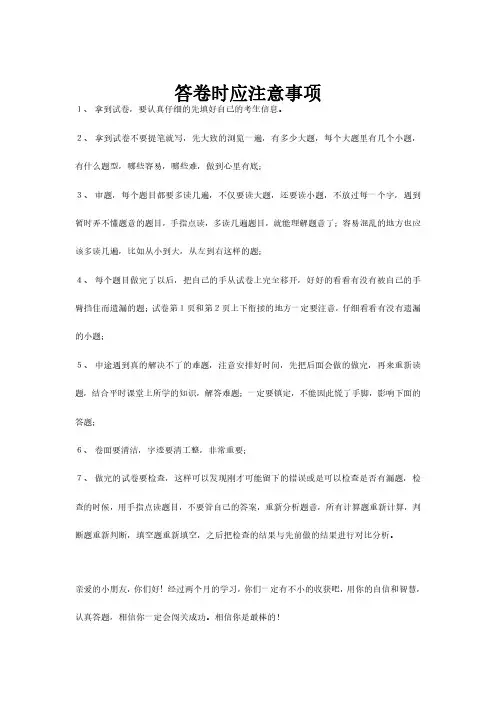
答卷时应注意事项1、拿到试卷,要认真仔细的先填好自己的考生信息。
2、拿到试卷不要提笔就写,先大致的浏览一遍,有多少大题,每个大题里有几个小题,有什么题型,哪些容易,哪些难,做到心里有底;3、审题,每个题目都要多读几遍,不仅要读大题,还要读小题,不放过每一个字,遇到暂时弄不懂题意的题目,手指点读,多读几遍题目,就能理解题意了;容易混乱的地方也应该多读几遍,比如从小到大,从左到右这样的题;4、每个题目做完了以后,把自己的手从试卷上完全移开,好好的看看有没有被自己的手臂挡住而遗漏的题;试卷第1页和第2页上下衔接的地方一定要注意,仔细看看有没有遗漏的小题;5、中途遇到真的解决不了的难题,注意安排好时间,先把后面会做的做完,再来重新读题,结合平时课堂上所学的知识,解答难题;一定要镇定,不能因此慌了手脚,影响下面的答题;6、卷面要清洁,字迹要清工整,非常重要;7、做完的试卷要检查,这样可以发现刚才可能留下的错误或是可以检查是否有漏题,检查的时候,用手指点读题目,不要管自己的答案,重新分析题意,所有计算题重新计算,判断题重新判断,填空题重新填空,之后把检查的结果与先前做的结果进行对比分析。
亲爱的小朋友,你们好!经过两个月的学习,你们一定有不小的收获吧,用你的自信和智慧,认真答题,相信你一定会闯关成功。
相信你是最棒的!2022-2023学年九年级英语全一册单元模块满分必刷题(人教版)Unit 6【刷语法】(重点语法提升练)一般过去时的被动语态什么是被动语态?英语动词有两种语态,主动语态和被动语态。
主动语态的主语是动作的执行者;被动语态的主语是动作的承受者,理解为“被……” 。
不同时态的被动语态:被动语态的结构是“be+过去分词”,be动词有时态、人称和数的变化。
当不知道动作的执行者或没必要指出动作的执行者,只强调突出动作的承受者时,用被动语态。
一般过去时的被动语态:1.肯定结构:was / were+过去分词;2.否定结构:wasn’t / weren’t+过去分词;3.一般疑问句把was / were放到句首。
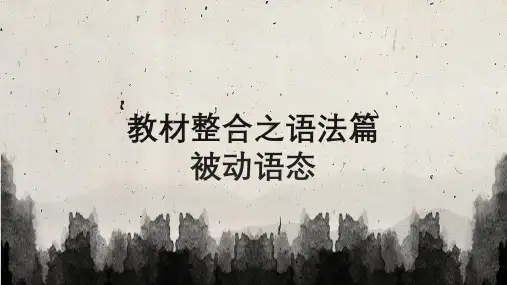
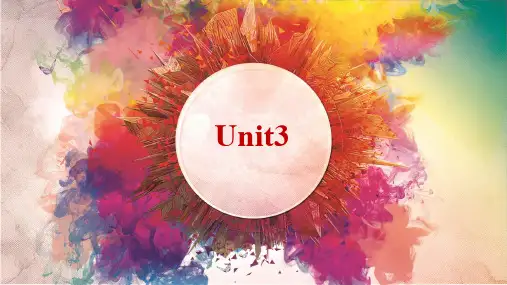

人教九年级英语Unit 6专题讲练Unit 6 When was it invented?·一般过去时被动语态语法归纳1. 一般过去时的被动语态的构成一般过去时的被动语态表示在过去某一时间发生的被动性动作,由“was/were+及物动词的过去分词+by+动作执行者”构成。
如果无须说明动作的执行者是谁,则可省略“by+动作执行者”。
注意:不及物动词的过去分词只能用于完成时,不能用于被动语态。
It was generally believed by the scientists in thepast that the sun was the center of the universe.过去,科学家们普遍认为,太阳是宇宙的中心。
2.一般过去时的被动语态的基本句式句式构成例句肯定句主语+was/were+及物动词的过去分词+其他。
The road was built in1998. 这条道路于1998年修建。
否定句主语+was/were not(weren’t)+及物动词的过去分词+其他。
The mouse ran toofast and was notcaught by the cat. 老鼠跑得太快,没有被猫逮住。
一般疑问句及答语Was/Were+主语+及物动词的过去分词+其他。
肯定回答:Yes, 主语+was/were.否定回答:No, 主语+wasn’t/weren’t.—Was this articlewritten by Lu Xun?这篇文章是鲁迅写的吗?—Yes, it was. 是的,它是。
/No, itwasn’t. 不,它不是。
特殊疑问句特殊疑问句+was/were+主语+及物动词的过去分词。
Where were the lostchildren found? 这些丢失的孩子们是在哪儿找到的?3. 特殊情况的被动语态1). 含有双宾语的被动语态含有双宾语的主动句变被动句时,可以将其中任何一个宾语变为被动结构的主语。
![英语九年级上册Unit6 When was it invented[被动语态]](https://uimg.taocdn.com/40220a39a9114431b90d6c85ec3a87c240288a03.webp)
比照一般过去时和一般将来时的被动语态一、构成比照1. 一般过去时的被动语态:was / were + 动词的过去分词如:The teaching building was built six years ago.这座教学楼建于六年前。
2. 一般将来时的被动语态:“will be + 动词的过去分词〞或“am / is / are going to be + 动词的过去分词〞如:This museum will / is going to be finished next month.这座博物馆将于下个月竣工。
二、否认形式和疑问形式比照1. 否认形式:★一般过去时的被动语态:was / were + not + 动词的过去分词如:The window was not broken by him.窗玻璃不是他打碎的。
★一般将来时的被动语态:“will not be + 动词的过去分词〞或“am / is / are not going to be + 动词的过去分词〞如:The new film will not / isn’t going to be shown in our city next week.那部新电影下周不在我们城市放映。
2. 疑问形式:★一般过去时的被动语态:通常把was / were置于主语前。
如:Were the textbooks written in 2000?这些课本是2000年写的吗?Where were those buses made?那些公共汽车是哪里制造的?★一般将来时的被动语态:将will, (be going to中的) am / is / are置于主语之前。
如:When will the road be opened to traffic?这条路什么时候通车?Are we going to be asked to attend the meeting?我们会被邀请参加会议吗?【趁热打铁】Ⅰ. 请选出能填入空白处的最正确选项。
教学内容:被动语态
教学目标:
知识目标:明白被动语态的用法,学会使用被动语态。
能力目标:会运用语法结构排除一定的干扰,提高解题能力。
教学重点:学习被动语态的构成以及用法。
教学难点:被动语态的用法。
教学方法:参与式教学法。
教学用具: PPT课件。
教学过程Before class:(先学任务)
1)判断下列句子是主动语态还是被动语态。
•Many people speak Chinese .
•English is studied by us .
•We clean our classroom .
•The leaves are picked by hand .
•I use the telephone .
During class: Step1: warming up & lead in
1.Check students’ assignment and introduce what they will
learn in this class.
2.语态的种类和基本概念
主语是动作的执行者就用主动语态Many people speak Chinese
主语是动作的承受者就用被动语态The leaves are picked by hand Step2: 被动语态的构成
Step3:主动语态变为被动语态
主动语态变为被动语态的方法:
1 . 主动句中的宾语变成被动句的主语.
2 . 主动句中的谓语动词变成被动句的be + 过去分词.
3 . 主动句中的主语变成被动句by 的宾语, 放在谓语动
词后面. 如果不强调动作执行者时, by 短语可省略.
Many people speak English .
English is spoken by many people . 当堂训练
Change the following sentences into the Passive voice
1. They play basketball in their school .
2. I washed my clothes yesterday .
3. We clean our classroom
4. I use the telephone
5. bHe bought a new bike last week
Homework
How to change the following sentence into the Passive voice
He will sing a song tomorrow。